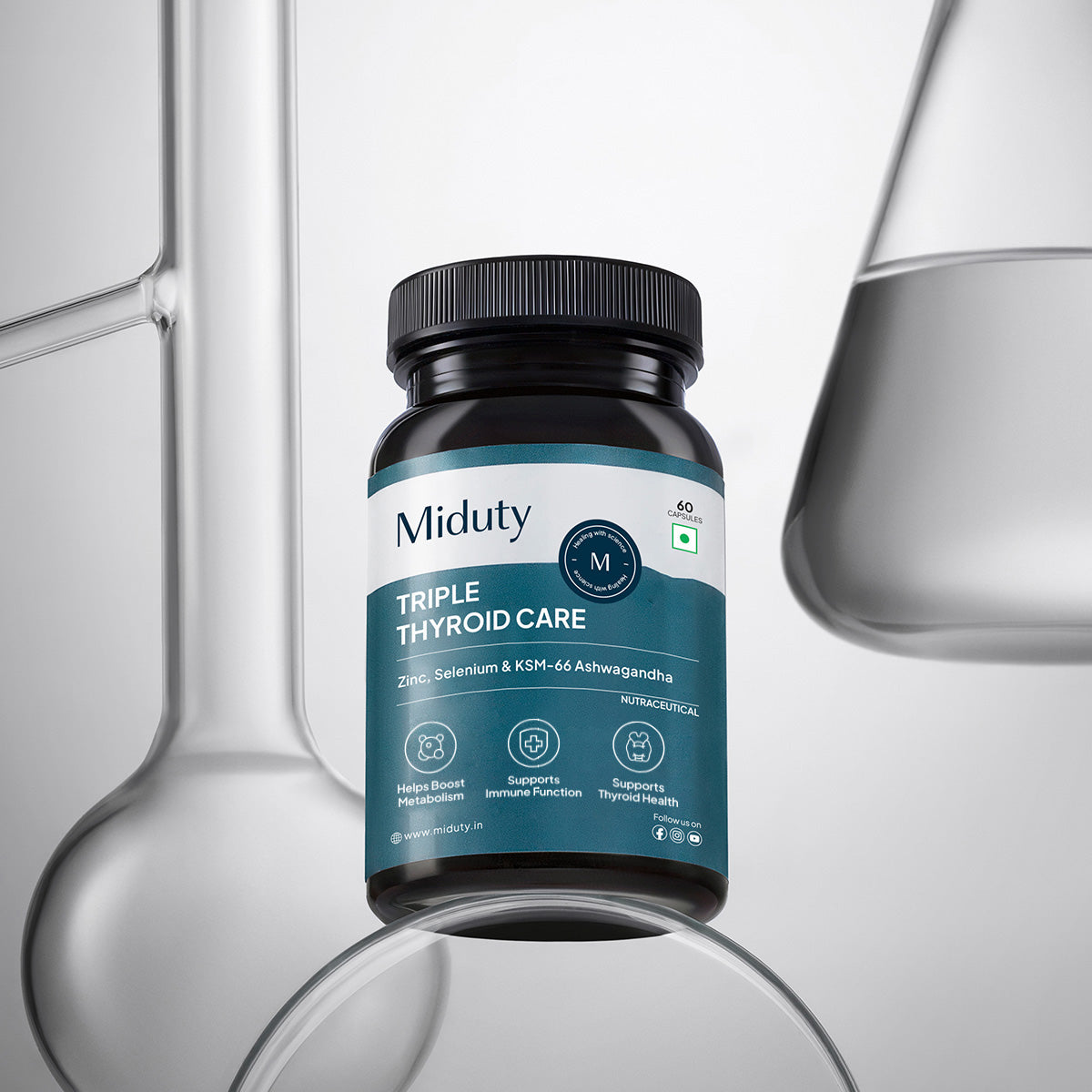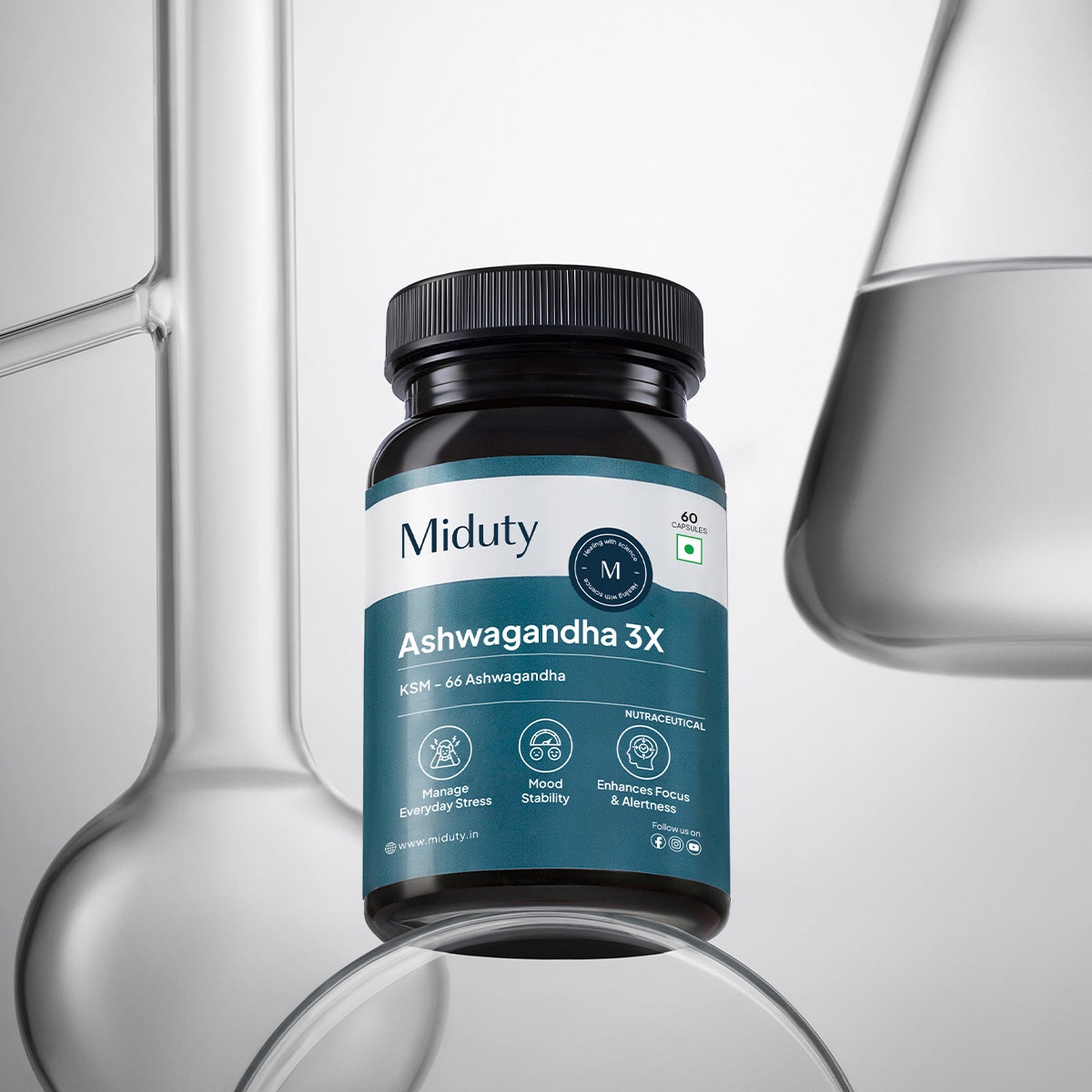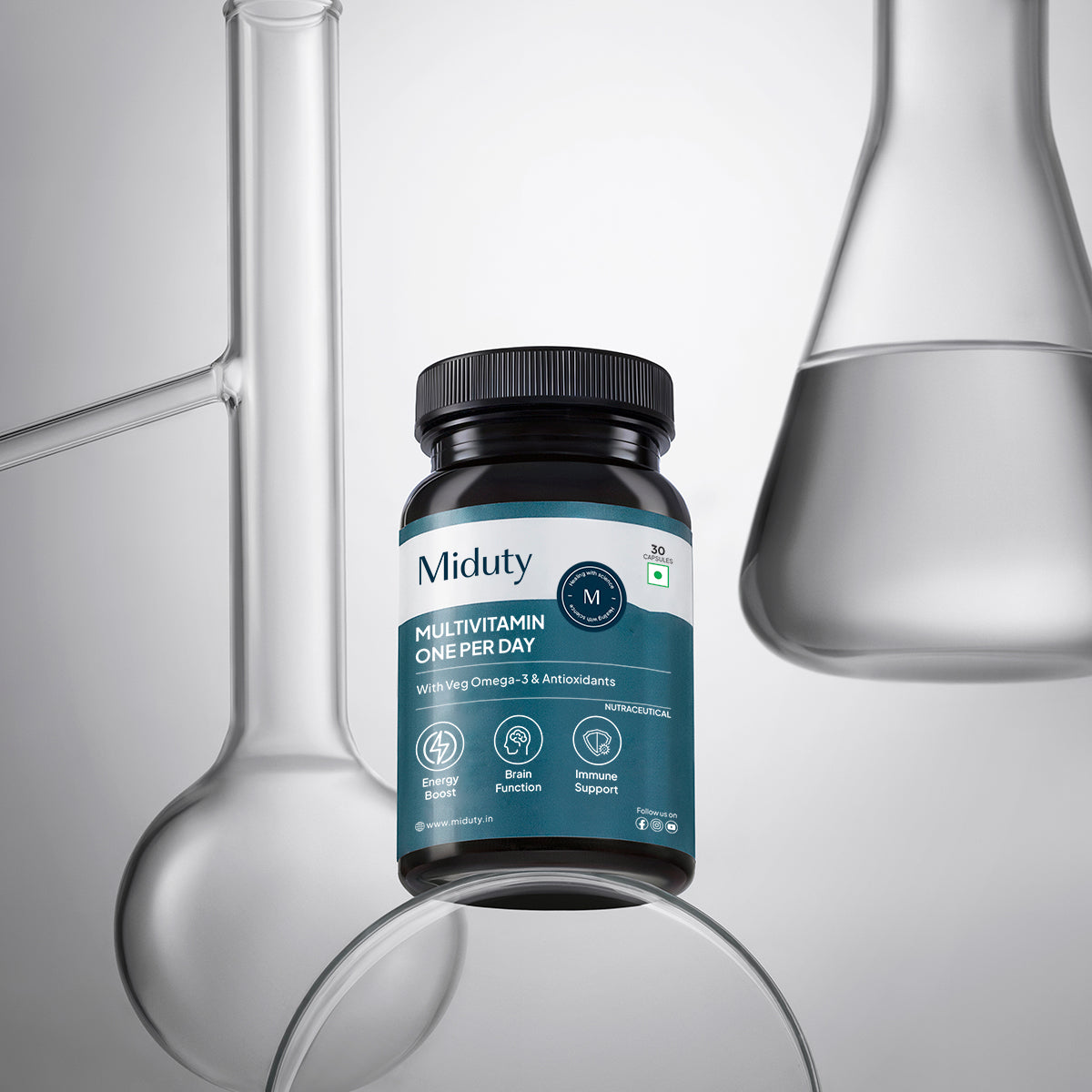
How to Check Thyroid at Home | 3 Easy Methods
Key Takeaways
1. Thyroid Disorders Are Common: Hypothyroidism affects around 10-12% of women over 35 in India, and early detection is crucial for overall health.
2. Watch for Symptoms: Fatigue, unexplained weight changes, mood swings, hair loss, and digestive issues can be early indicators of thyroid imbalance.
3. Three Easy Home Methods: Neck self-examination, basal body temperature testing, and at-home thyroid test kits help detect early warning signs before lab tests.
4. Micronutrients Matter: Deficiencies in selenium, zinc, and iodine can impair thyroid function and hormone production.
5. Lifestyle and Supplements Support Thyroid Health: Balanced diet, stress management, adequate sleep, and supplements like selenium, zinc, and Ashwagandha can help maintain healthy thyroid function.
A 2025 study in India reports hypothyroidism in 10-12% of women, especially those over 35. [1] Have you been feeling unusually tired, gaining or losing weight without reason, or experiencing mood swings lately? These could be subtle signs of thyroid imbalance, a condition that affects millions of people, especially women. The thyroid gland plays a vital role in regulating your body's metabolism, energy levels, and hormonal balance. When the thyroid isn't functioning properly, it can disrupt everything from your mood to your weight, heart rate, and even your sleep quality.
You can perform a few simple checks at home to get an idea of whether your thyroid might be underactive (hypothyroidism) or overactive (hyperthyroidism). Understanding these basic home methods can help you detect early warning signs, seek timely treatment, and maintain a healthy thyroid naturally. Here, you will know how to check your thyroid at home step by step.
Understanding the Thyroid Gland
The thyroid gland is one of the most powerful glands in the endocrine system. It produces two major hormones: triiodothyronine (T3) and thyroxine (T4). These hormones control how fast or slow your cells use energy basically, they manage your metabolism. Every heartbeat, breath, and even how fast you burn calories is connected to thyroid function.
The thyroid also plays a crucial role in:
- Regulating body temperature
- Supporting brain function and mood
- Controlling cholesterol levels
- Maintaining skin, hair, and nail health
- Balancing reproductive hormones
But when it produces too little or too much hormone, it can cause either hypothyroidism (underactive thyroid) or hyperthyroidism (overactive thyroid). Understanding how your thyroid works is the first step toward learning how to check its health at home.
Common Thyroid Disorders
1. Hypothyroidism:
Hypothyroidism occurs when the thyroid gland produces insufficient thyroid hormones. In severe cases, it may affect heart health and cognitive function.
2. Hyperthyroidism:
Hyperthyroidism is characterized by the overproduction of thyroid hormones, which accelerates the body's metabolism.
3. Goiter:
A goiter is an abnormal enlargement of the thyroid gland, often due to iodine deficiency, hypothyroidism, or hyperthyroidism. [2]
4. Thyroid Nodules:
Thyroid nodules are lumps or growths in the thyroid gland, which are mostly benign but occasionally can be cancerous. They may not show any symptoms, but some can cause swelling, pain, or changes in hormone levels.
The deficiencies of micronutrients like selenium, zinc, and iodine can impair thyroid function. Selenium deficiency led to a decrease in (T3) levels. Zinc deficiency also resulted in lower T3 levels. Iodine deficiency resulted in a significant reduction in both total thyroxine (T4) and free T4 levels, accompanied by an increase in thyroid-stimulating hormone (TSH) levels. Combined selenium and zinc deficiency caused an even greater drop in T3. [3]
Common Symptoms of Thyroid Imbalance
Before checking your thyroid at home, it's essential to understand the symptoms of both underactive and overactive thyroid.
Symptoms of Hypothyroidism (Underactive Thyroid):
- Unexplained weight gain
- Fatigue and weakness
- Feeling cold all the time
- Dry skin and brittle hair
- Hair loss
- Constipation
- Puffy face or swelling in the neck
- Depression or mood swings
- Irregular or heavy menstrual periods
Symptoms of Hyperthyroidism (Overactive Thyroid):
- Unexplained weight loss
- Increased appetite
- Feeling anxious or restless
- Rapid heartbeat or palpitations
- Sweating and heat intolerance
- Shaky hands or trembling
- Difficulty sleeping
- Frequent bowel movements
- Thinning hair
If you notice a combination of these symptoms, it's worth performing an initial at-home check.
3 Easy Methods to Check Thyroid at Home
There isn't just one way to check your thyroid at home. In fact, there are a few easy and practical methods you can use depending on what's available and what symptoms you're observing.
A. The Neck Check Method
One of the easiest ways to look for thyroid abnormalities is by examining your neck.
Here's how to do it:
- Stand in front of a mirror, ensuring good lighting.
- Focus on the area just below your Adam's apple and above your collarbone.
- Take a sip of water and swallow slowly.
- Watch your neck closely as you swallow and look for any unusual bulges, lumps, or swelling in that area.
- Repeat a few times to be sure.
What to look for:
- A visible lump or asymmetrical swelling may suggest an enlarged thyroid (goiter).
- If you notice any irregularity, it's best to consult your doctor or endocrinologist for further evaluation.
B. The Basal Body Temperature Test
Your thyroid helps regulate body temperature. A consistently low body temperature may indicate an underactive thyroid. [4]
Here's how to check:
- Keep a thermometer by your bedside before going to sleep.
- Upon waking (before getting out of bed or moving too much), measure your temperature under your arm.
- Record the temperature for 5 consecutive days.
What your temperature means:
- Normal: Between 97.8°F to 98.2°F (36.5°C to 36.8°C)
- Below 97.8°F consistently may indicate hypothyroidism
- Above 98.2°F consistently may indicate hyperthyroidism
Note: Women should perform this test after their menstrual period for more accurate results, as hormone fluctuations can affect body temperature.
C. The At-Home Thyroid Test Kits
Several companies now offer at-home thyroid test kits that allow you to check your thyroid hormone levels (TSH, T3, T4) without visiting a lab. [5]
How it works:
- You order a kit online or buy one from a pharmacy.
- Prick your finger to collect a small blood sample.
- Send the sample to the lab in the provided prepaid envelope.
- Get your results online within a few days.
These tests can measure:
- TSH (Thyroid Stimulating Hormone) - indicates how hard your thyroid is working.
- Free T3 and Free T4 - active thyroid hormones that show gland performance.
- Thyroid Antibodies (TPO, TgAb) - helps detect autoimmune thyroid diseases like Hashimoto's or Graves' disease.
While convenient, these test kits are for screening purposes. Always discuss results with your healthcare provider for accurate interpretation.
Tips for Supporting Thyroid Health Naturally
While diagnosis and treatment should be guided by a doctor, you can support your thyroid naturally through lifestyle and nutrition:
- Eat iodine-rich foods like seaweed, iodized salt, dairy, and eggs.
- Include selenium and zinc — found in Brazil nuts, pumpkin seeds, and seafood.
- Limit goitrogenic foods (like raw cabbage, cauliflower, and soy) if you have hypothyroidism.
- Manage stress through meditation, yoga, or deep breathing.
- Sleep well — aim for at least 7-8 hours of quality sleep.
- Avoid smoking and excessive caffeine, as they can interfere with thyroid function.
Which Supplement is good for the Thyroid?
To make your thyroid function better, you require Zinc, Selenium, Ashwagandha to target root cause. You may get these from your daily diet, but to fulfill the daily recommended dosage requires the addition of supplements that have a blend of these powerful ingredients to provide an additional boost. [6]
A study with 68 women who had hypothyroidism tested zinc (30 mg) and selenium (200 mcg) supplements for 12 weeks. The results showed that taking zinc and selenium together helped increase thyroid hormones (FT3 and FT4) and lowered TSH levels. The strongest improvements were seen in the group that took both zinc and selenium. [7]
Ashwagandha, a traditional Ayurvedic herb, may help support thyroid health. In a study of 50 adults with mild hypothyroidism, 600 mg daily for 8 weeks improved thyroid hormone levels with minimal side effects, showing its potential as a natural thyroid booster. [8]
Conclusion
Your thyroid might be small, but it has an enormous impact on your overall well-being. From energy and metabolism to mood and digestion, it influences countless functions in your body. The good news? Checking your thyroid at home is easier than ever.
By learning simple techniques like neck self-examination and basal body temperature testing, or using at-home thyroid kits, you can keep a close eye on your thyroid health. Combine these with symptom tracking, healthy eating, and lifestyle changes, and you'll have a complete system for early detection and prevention.
FAQ's on How to Check Thyroid at Home?
Q1. How can I check my thyroid by myself?
You can check your thyroid at home by performing a neck self-exam to look for swelling or lumps, monitoring your basal body temperature, or using at-home thyroid test kits to screen hormone levels.
Q2. How to check the thyroid with fingers?
You can check your thyroid with your fingers by gently feeling the front of your neck just below the Adam's apple while swallowing, noting any lumps, bumps, or swelling that may indicate thyroid enlargement.
Q3. Can I check my thyroid levels at home?
Yes, you can check your thyroid levels at home using at-home thyroid test kits, which measure TSH, Free T3, Free T4, and thyroid antibodies from a small blood sample collected via a finger prick.
Q4. What is the best time to check the thyroid?
The best time to check your thyroid at home is in the morning, ideally before eating or drinking, when your body is at rest, as this ensures more accurate basal body temperature readings or hormone-level assessments.
Q5. How do I know if my thyroid is ok?
You can get an initial idea by observing common symptoms (like unexplained fatigue, weight changes, or hair loss), performing a neck self-exam, monitoring basal body temperature, or using at-home thyroid test kits but a blood test by a doctor is the only way to confirm thyroid health accurately.
References














